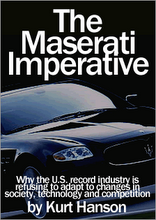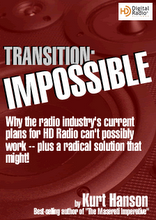I believe that the root cause of the record industry's problems are a belief on the part of senior management that they have the RIGHT to have their glory years -- that shining period when all the factors were lining up in their favor, and sales volume, profitability, and executive perks were all at their peak -- extended INFINTELY into the future, regardless of changes in technology, consumer tastes, or
 competition for the entertainment dollar.
competition for the entertainment dollar.In other words, the record executive who was driving a Maserati in the '90s believes he has a right to continue to do so forever.
(By the way, I realize that a more-accurate car model would probably be something like a high-end Mercedes, but I don't know my Mercedes model numbers and, what's more, "The Maserati Imperative" would be a great book title, wouldn't it? (See illustration.))
DVDs are an increasingly better value relative to CDs
Here's the primary problem causing the decline in CD sales (in my opinion):
Other segments of the entertainment industry are aggressively competing on price in an attempt to grow their overall revenues. And if a consumer has got a somewhat limited budget for entertainment purchases, and other things are becoming better values than music, he or she is going to start spending less on music and more on other things. (D'oh!)
You may recall, quite a few years ago, when the movie studios realized that they would make a lot more money selling millions of DVDs at $20 than tens of thousands at $60.
That pricing strategy really, really worked! As a result, during the past few years, the street price-per-hour of VIDEO -- with high production values, and attractively packaged -- has come down to about $7 per hour of content in the case of movies (and as low as $3 per hour if you take into account bonus features) and, even more appealing as low as $1.50 per hour in the case of TV shows (see illustration).
Meanwhile, the record industry is obstinantly trying to hold to their traditional price-per-hour of about $20 per hour of content for mere AUDIO.
And why do they think that consumers will let them get away with this? The Maserati Imperative!

http://www.washingtonpost.com/wp-dyn/content/article/2007/04/17/AR2007041701869.html
Other factors
I'll expand on this point later, but let me insert a note here that CD burning has always been with us. Only back in my day, it was called "home taping." (Ah, the TDK SA-C90 cassette!)
This practice was (and probably still is) an excellent music-discovery medium, second perhaps only to radio. Taping friends' LPs is how I discovered Bruce Springsteen, Led Zeppelin, and many other acts that I later went on to spend lots of money on. For acts that you like, eventually you prefer to own an "official" copy, not something that lacks cover art and where you made the label using a Sharpie.
As it was, so it shall always be.
Deceptive bullsh*t
"CD sales have slumped 25 % since 2000, while webcasting audiences have grown dramatically." -- SoundExchange FAQ
As Penn & Teller (well, actually, Penn) would say, "Bullshi*t!" That's being presented as a causal relationship when they know full well that's not true!
It would be equally true to say "CD sales have slumped 25 % since 2000, while consumption of Starbucks Orange Mocha Frappuccinos has grown dramatically."
Logically, therefore, Congress should impose a tax on Orange Mocha Frappuccinos and give the money to the big four record labels!
"Hey, kids, collect the whole set!"
I believe the bloggers and anlaysts who believe that the era of the CD is over are wrong. Why? Because we live in a culture where people like owning things that they like.
Example: I've watched every episode of "30 Rock" this season at least twice, but when that boxed set of Season 1 gets released in September, I'll be at the front of the line to buy it so I can give it an honored place on my bookshelf full of box sets of my favorite TV shows' best seasons.
Technology creates opportunties, but opportunities get ignored
The technology industy has handed the record business a potentially amazingly wonderful lifeline: They're selling kids (and, not to mention, adults) MP3 music players that hold 20,000 songs!
Yet what is the record industry doing to take advantage of this opportunity? Nothing.
Let's do the math: The net price per track of music when purchased in the CD format -- with nice packaging, near-perfect fidelity, and no copy restrictions, and despite expensive physical distribution costs -- is about 90 cents. But for download sales -- with no packaging, reduced fidelity, and signficant copy restrictions, and NO physical distribution costs, they're trying to get 99 cents! (And apparently, given what we read about how Steve Jobs had to cajole them into that, they're not happy with that!)
And then they have the sheer, unmitigated gall to complain to Congress that they need legislative relief because download sales aren't growing fast enough to perfectly supplant CD sales declines!
Realize that their pricing scheme means it would cost a teenager $19,800 to fill up their MP3 player legally. But the execs who run labels intend to hold that price, no matter what is happening in the worlds of technology, society, or their competition (e.g., declining DVD prices)! Why? Because they feel they have the right to maintain the same pricing, sales volume, and profit margins as they had in their glory years. It's the Maserati Imperative!
Footnote: Yes, I'll admite there is a legal way for kids to fill their MP3 devices (as long as they're not iPods) -- the subscription plans offered as Napster-to-Go, Rhapsody-to-Go, etc. Two problems, though: (1) They are not consistent with the American desire for ownership of things (which is especially true for kids ("Kids, collect 'em!")). (2) To maintain your collection of tracks, you're looking at a commitment of $15/month for the rest of your life, so it's still a prospective $10,000 commitment if you want to go that route. In contrast, if you spend that same $15 on a CD this month instead, at least it's yours for the rest of your life.




1 comment:
Downloaded music may have one other disadvantage compared to physical media - insurability. If someone has a collection of CDs, tapes and records worth thousands and it is lost due to fire or theft, there is little doubt it would be a covered loss under most homeowner's and renter's insurance policies. However, if they had spent the same amount on legal downloads of music from websites like iTunes and their music collection resided entirely on a computer's hard drive and an iPod (and maybe some on home-burnt CDs), and those were lost to fire or theft, what do you think are the chances they would be covered by insurance?
Post a Comment